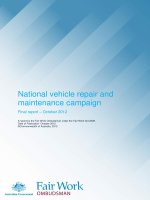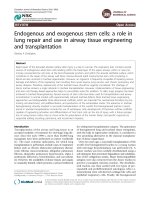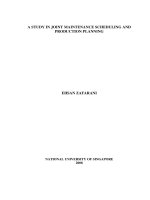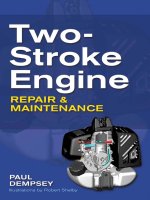Aerospace Engineering (Maintenance, Repair and Overhaul) Foundation Certificate
Bạn đang xem bản rút gọn của tài liệu. Xem và tải ngay bản đầy đủ của tài liệu tại đây (157.59 KB, 15 trang )
Programme Specification
Title of Course:
Foundation Certificate in Aerospace Engineering (Maintenance,
Repair and Overhaul)
Date Specification Produced: May 2012
Date Specification Last Revised: Jun 2012
This Programme Specification is designed for prospective students, current students,
academic staff and potential employers. It provides a concise summary of the main features
of the programme and the intended learning outcomes that a typical student might
reasonably be expected to achieve and demonstrate if he/she takes full advantage of the
learning opportunities that are provided. More detailed information on the teaching, learning
and assessment methods, learning outcomes and content of each module can be found in
Student Handbooks and Module Descriptors.
SECTION 1:
GENERAL INFORMATION
Title:
Foundation Certificate in Aerospace Engineering (MRO)
Awarding Institution:
Kingston University, London
Teaching Institution:
Marshall Aerospace, AeroAcademy
Location:
Cambridge, England
Programme Accredited by:
Royal Aeronautical Society (RAeS)
SECTION2:
THE PROGRAMME
A. Programme Introduction
The purpose of the Foundation Certificate is to prepare students for engaging in the Foundation
Degree in Aerospace Engineering (Maintenance, Repair and Overhaul) which, in turn, is to introduce
and prepare students for supervisory/management roles in the Aerospace Maintenance, Repair and
Overhaul (MRO) industry, where their knowledge of aerospace systems, practises, safety awareness
and legal requirements enable them to manage and supervise such activities.
Features of the Field
•
•
•
•
•
Has been designed to provide students with the fundamental engineering skills and
knowledge in preparation for understanding of Aircraft Maintenance, Repair and Overhaul
(MRO) organisations (EASA Part 145) in the subsequent years of study.
Is designed to broaden the knowledge and perspective of students wishing to pursue a
career in the Aircraft Industry.
Provides progression and entry to the Foundation Degree in Aircraft Technical Management
(MRO).
Is designed to provide an academic award for learning in the subject area of Aircraft
Maintenance, Repair and Overhaul Engineering that was hitherto not recognised, and
thereby encourage more students to consider a career in the aircraft maintenance, repair
and overhaul industry.
Provides a foundation for lifelong learning in the Profession.
B. Aims of the Programme
The aims of the programme are to:
• Provide a basic, leading to intermediate, level course that fulfils the requirements of
higher education in engineering.
• Provide an academic framework which will equip students to progress to the
Foundation Degree.
• Provide students with the opportunity to develop their written and oral
communications skills, and prepare them for further study at Foundation Degree level.
• Prepare students for Continuous Professional Development (CPD) by encouraging the
use of personal development plans and introducing them to professional institutions.
Satisfactory completion of the Foundation Certificate provides progression to a Foundation Degree
course and, with further study, the BSc (Hons) Aircraft Engineering Top-up course potentially leading
to post graduate studies for MSc Aircraft Engineering. The BSc (Hons) is accredited by the RAeS at
IEng level and thus provides the educational requirements for incorporated professional engineer
supervisory status.
C. Intended Learning Outcomes
The programme provides opportunities for students to develop and demonstrate knowledge and
understanding, skills and other attributes in the areas defined below. The programme outcomes are
referenced to the QAA subject benchmarks for Engineering and the Framework for Higher Education
Qualifications in England, Wales and Northern Ireland (2008), and relate to the typical student.
C1. Knowledge and Understanding
On completion of the Programme, students will be able to demonstrate:
(A1)
Their knowledge and understanding of the basic principles that underpin engineering
in general and Aircraft engineering in particular and readiness to embark on a Foundation
Degree Course.
(A2)
Basic knowledge and understanding of the Aircraft Maintenance, Repair and
Overhaul (MRO) industry.
(A3)
Basic knowledge and understanding of light aircraft aerodynamics and mechanical,
avionic and propulsion systems.
(A4)
An understanding of the need for ensuring a clean working environment, to follow all
safety precautions with regard to self, others, equipment and aircraft and to foster, and nurture
in others, a sound and responsible attitude to flight safety and airworthiness of aircraft.
C2. Cognitive (thinking) Skills
On completion of the Programme, students will be able to demonstrate:
(B1)
The ability to use mathematical and descriptive skills to explain basic concepts in
engineering.
(B2)
The ability to provide evidence of their analytical and evaluative capabilities
(B3)
An understanding of the implications of their actions and decisions in relation
to aircraft maintenance repairs and overhaul activities.
(B4)
An understanding of their actions and decisions with respect to safety critical
systems and structures.
(B5)
Their ability to reflect on their learning, identifying strengths and weaknesses,
setting new targets and developing action plans to meet them.
C3. Practical Skills
On completion of the Programme, students will be able to demonstrate:
(C1)
The ability to work effectively and safely in an aircraft maintenance environment,
whilst having due regard for the laws and regulations under which they must work and
supervise others accordingly.
(C2)
Use of a range of ICT resources for communication and research, to retrieve and store
information and data, and to produce documents incorporating different types of
information.
(C3)
How to operate safely and appropriately in close proximity to aircraft, and in hangars,
workshops and understand the hazards therein.
(C4)
Use of ICT with respect to research, learning, creative writing, reporting and use of
CBT and applications relevant to the subject area (e.g. Multisim) as well as approved
calculators.
C4. Key Skills
The embedded Key Skills fall within the seven categories defined within the University’s ‘KEYS’ Skills
Framework for undergraduate and postgraduate courses.
The matrix on below details the modules that will normally be expected to incorporate all categories
of skills within the programme specification, together with evidence relating to where they are
facilitated and how they are to be assessed. Skills should be improved as appropriate for the
discipline (subject) and year of the course.
Programme Learning Outcomes Year Zero
Knowledge and Understanding
A1
A2
On completion of the Programme, students
will be able to demonstrate:
Their knowledge and understanding of the
basic principles that underpin engineering
in general and Aircraft Maintenance, Repair
and Overhaul engineering in particular and
readiness to embark on a Foundation
Degree Course.
Basic knowledge and understanding of the
Aircraft Maintenance, Repair and Overhaul
(MRO) industry.
B1
B2
A3
Basic knowledge and understanding of light B3
aircraft aerodynamics and mechanical,
avionic and propulsion systems.
A4
An understanding of the need for ensuring
a clean working environment, to follow all
safety precautions with regard to self,
others, equipment and aircraft and to
foster, and nurture in others, a sound and
responsible attitude to flight safety and
airworthiness of aircraft.
B4
Intellectual skills – able to:
Subject Practical skills
On completion of the Programme, students
will be able to demonstrate:
The ability to use mathematical and
descriptive skills to explain basic concepts
in engineering.
On completion of the Programme, students
will be able to demonstrate:
The ability to work effectively and safely in
an aircraft maintenance environment,
whilst having due regard for the laws and
regulations under which they must work
and supervise others accordingly.
The ability to provide evidence of their
analytical and evaluative capabilities
An understanding of the implications of
their actions and decisions in relation to
aircraft maintenance repairs and overhaul
activities.
An understanding of their actions and
decisions with respect to safety critical
systems and structures.
C1
C2
C3
C4
Use a range of ICT resources for
communication and research, to retrieve
and store information and data, and to
produce documents incorporating different
types of information.
How to operate safely and appropriately in
close proximity to aircraft, and in hangars,
workshops and understand the hazards
therein.
Use ICT with respect to research, learning,
creative writing, reporting and use of CBT
and applications relevant to the subject
area (e.g. Multisim) as well as approved
calculators.
B5
AK1
AK2
AK3
AK4
Self Awareness Skills
Take responsibility for own learning and
plan for and record own personal
development
Recognise own academic strengths and
weaknesses, reflect on performance and
progress and respond to feedback
Organise self effectively, agreeing and
setting realistic targets, accessing support
where appropriate and managing time to
achieve targets
Work effectively with limited supervision in
unfamiliar contexts
BK1
Their ability to reflect on their learning,
identifying strengths and weaknesses,
setting new targets and developing action
plans to meet them.
Communication Skills
Express ideas clearly and unambiguously in
writing and the spoken work
CK1
Interpersonal Skills
Work well with others in a group or team
BK2
Present, challenge and defend ideas and
results effectively orally and in writing
CK2
Work flexibly and respond to change
BK3
Actively listen and respond appropriately to
ideas of others
CK3
Discuss and debate with others and make
concession to reach agreement
CK4
Give, accept and respond to constructive
feedback
Show sensitivity and respect for diverse
values and beliefs
Management & Leadership Skills
Determine the scope of a task (or project)
CK5
DK1
Research and information Literacy Skills
Search for and select relevant sources of
information
EK1
Numeracy Skills
Collect data from primary and secondary
sources and use appropriate methods to
manipulate and analyse this data
Present and record data in appropriate
formats
FK1
DK2
Critically evaluate information and use it
appropriately
EK2
FK2
DK3
Apply the ethical and legal requirements in
both the access and use of information
EK3
Interpret and evaluate data to inform and
justify arguments
FK3
DK4
Accurately cite and reference information
EK4
Be aware of issues of selection, accuracy
FK4
Identify resources needed to undertake the
task (or project) and to schedule and
manage the resources
Evidence ability to successfully complete
and evaluate a task (or project), revising
the plan where necessary
Motivate and direct others to enable an
sources
DK5
GK1
GK2
Use software and IT technology as
appropriate
Creativity and Problem Solving Skills
Apply scientific and other knowledge to
analyse and evaluate information and data
and to find solutions to problems
Work with complex ideas and justify
judgements made through effective use of
evidence
and uncertainty in the collection and
analysis of data
effective contribution from all participants
D. Entry Requirements
The minimum entry qualifications for the programme are:
Points:
80
From A Levels:
A Level in mathematics or a suitable science subject are desirable, but
not essential.
BTEC:
BTEC National Diploma or Certificate in engineering subjects may satisfy
the entry requirements provided the student meets the GCSE
requirement listed below.
Plus:
Five GCSEs (Grade C and above) including English language and,
mathematics or Functional (Key) Skills Level 2 in Literacy, ICT and
Numeracy or Adult Numeracy and Literacy Level 2
Applicants will need to attend an open day and take an induction test. You may also be required to
attend an interview.
The course is open to Home and EU students at present.
Language proficiency:
International English Language Testing System (IELTS ) score of Band 6 per subject
headings (Reading, Listening, Speaking and Writing)
or;
Testing of English as a Foreign Language (TOEFL) score of 22 per subject headings
(Reading, Listening, Speaking and Writing) or equivalent is required for those for
whom English is not their first language.
Non-standard entry qualifications are permitted but will be dealt with on a case by case basis.
E. Programme Structure
This full-time programme is part of the Kingston University Undergraduate Regulations (UR).
Programmes are made up of modules which are assigned to levels. Levels are more challenging as
student’s progress through the programme.
The franchised partner intake starts in September at the start of the Higher Education academic year.
Full details of module sequence, course duration and start and finish dates can be found in Liaison
Documents and course literature. Details are also included on the KU and partner organisation
websites, and in student handbooks.
E1. Professional and Statutory Regulatory Bodies
The course is accredited by the Royal Aeronautical Society (last visit 2012) and in some modules,
closely follows the EASA Part 66 syllabus. The course is not designed to provide students with CAA
licences although these can be pursued by the student under their own private arrangements.
E2. Outline Programme Structure
Each level is made up of four modules each worth 30 credit points. Typically a student must
complete 120 credits at each level. All students will be provided with the University regulations and
specific additions that are sometimes required for accreditation by outside bodies (e.g. professional
or statutory bodies that confer professional accreditation). Full details of each module will be
provided in module descriptors and student module guides.
Level 3
Compulsory modules
Engineering
Fundamentals
Aircraft
Materials,
Maintenance
and
Workshop
Aviation
Industry
Work Skills
Introduction
to
Aircraft
Module Credit
code
Value
Level
%
Written
exam
%
Practical
exam
%
Coursework
Teaching
Block
AE0721
30
3
60
0
40
1&2
AE0722
30
3
60
0
40
1&2
AE0723
30
3
0
0
100
1&2
AE0724
30
3
60
0
40
1&2
F. Principles of Teaching Learning and Assessment
The course is designed to embed key knowledge, skills and techniques at the point of first use to
provide a firm foundation for relevant learning to take place. The design provides students with
teaching and learning, checked by appropriate, timely assessment from a basics standpoint
progressing in logical steps through aircraft related systems with deliberate progress to more
complex issues and overall understanding.
Although systems are taught under specific headings each subject area is deliberately linked to each
other to form a coherent homogenous combination of flight, flight and ground safety and general
aircraft systems understanding and awareness. The objective of this approach is to produce students
familiar with supervision and management within the aircraft maintenance, repair and overhaul
industry from an aviation culture perspective.
Systems may be presented to students as either generic (systematic principles) or actual (using
existing designed and manufactured hardware) by moving from theory to practise in a
predetermined path. Assessment takes the form of stage or phase tests to assess progress and final
examinations at the end of each year. Some or all of the phase testing will contribute to overall
performance results.
Self Assessment is encouraged as direct involvement by students in assessing their own work, and
frequent opportunities to reflect on goals, strategies and outcomes are highly effective in enhancing
learning and achievement.
Academic Misconduct Rules are applied rigorously at every step to prevent unfair achievement of the
Foundation Certificate which is detrimental to both honest students and prospective employers alike.
All assessment is conducted with rigour, probity (due reflection of honest values) and fairness and
with due regard for security.
G. Support for Students and their Learning
Initial student support is provided on-site at the Marshall Aerospace, AeroAcademy via dedicated
foundation degree administrative staff. This permits students to raise concerns, queries or ask advice
which can usually be answered on-site although referral is made to Kingston University Student
Support when required.
Academic support is initially via the tutor/module leader and/or the student mentor who will follow
the students throughout their time on the course. Referral can be made to Kingston University as
and when required.
H. Ensuring and Enhancing the Quality of the Course
The University has several methods for evaluating and improving the quality and standards of its
provision. These include:
•
•
•
•
•
•
External examiners - Annually
Boards of Study, with student representation, half yearly
Annual review and development
Periodic review undertaken at the subject level
Student evaluation – mid and end of module
Moderation policies – After every summative assessment
I.
Employability Statement
The purpose of the course is to prepare and train individuals for the Foundation Degree Levels of
supervisory and management roles in Aircraft Maintenance, Repair and Overhaul (MRO)
organisations, taking account of the special needs of that industry. Employability skills include
exercises in CV writing, interview techniques and personal presentation (pride in appearance) as well
as self control and discipline, punctuality, personal values and attitude to safety.
Functional Skills including proficiency in applied mathematics, use of academic and engineering
English, syntax, punctuation and grammar are intrinsic in teaching/learning and assessment methods
as well as comprehensive use of ICT.
Training occurs within the background of an MRO company delivered and assessed by qualified
teaching staff who also have aircraft handling, servicing and maintenance experience, frequently
with the military background that incorporates necessary values listed above and, thus, students
have ready access to relevant employability issues directly from the training provider.
Graduates from this course can expect to find this qualification recognised by prospective employers
within the MRO Industry and that transferrable knowledge and skills qualify them for engineering in
other industries to which they may apply.
J.
Approved Variants from the Undergraduate Regulations
There are no approved variations of the UR.
K. Other sources of information that you may wish to consult
This programme is accredited as part of the BSc Aircraft Engineering pathway. Full details of this
programme can be found at www.kingston.ac.uk.
Development of Programme Learning Outcomes in Modules
This map identifies where the programme learning outcomes are assessed across the modules for
this programme. It provides an aid to academic staff in understanding how individual modules
contribute to the programme aims, and a means to help students monitor their own learning,
personal and professional development as the programme progresses and a checklist for quality
assurance purposes.
Programme Learning Outcomes
S
F
*
Intellectual Skills
Practical Skills
A1
A2
A3
A4
B1
B2
B3
B4
B5
C1
C2
C3
C4
indicates where a summative assessment occurs.
where formative assessment/feedback occurs.
Synoptic assessment, marks awarded in AE0723
F/S
S
S
S
S
S
S
F/S
S
S*
S*
F/S
S
S
S
S
S*
S
S*
S
S
F/S
S
AE0724
AE0723
AE0721
Module Code
Knowledge & Understanding
AE0722
Level 3
S
F/S
Identification of Key Skills within Modules
This map identifies where the Key Skills are assessed across the modules for this programme. It
provides an aid to academic staff in understanding how individual modules contribute to key skill
development, and a means to help students monitor their own learning, personal and professional
development as the programme progresses and is a checklist for quality assurance purposes.
Self Awareness
Communication Skills
Key Skills
Interpersonal Skills
Research and IT Literacy
Numeracy
Management and Leadership
Creativity
Solving
and
Problem
AK1
AK2
AK3
AK4
BK1
BK2
BK3
CK1
CK2
CK3
CK4
CK5
DK1
DK2
DK3
DK4
DK5
EK1
EK2
EK3
EK4
FK1
FK2
FK3
FK4
GK1
GK2
AE0724
AE0723
Module Code
AE0722
AE0721
Level 3
Indicative Module Assessment Map
Module
Leve Module Name
l
3
Engineering
Fundamentals
3
Materials,
Maintenance and
Workshop
3
Aviation Industry
Work Skills
3
Introduction
Aircraft
Coursework
Type
of Weighting
coursework
%
In-class assessment 40
Module
code
AE0721
Credit
value
30
Core/
option
Core
AE0722
30
Core
Workshop
assessment
AE0723
30
Core
to AE0724
30
Core
Assignment,
Case Study,
Synoptic
assessment
In-class assessment
S/F
*
S
Examination
Written/
Duration
practical
Written
2 hours
40
S
Written
100
S
40
S
Weighting %
60
S/F
*
S
2 hours
60
S
N/A
N/A
N/A
N/A
Written
2 hours
60
S
Technical Annex
Final Award(s):
Foundation Certificate in Aerospace Engineering
(Maintenance, Repair and Overhaul)
Intermediate Award(s):
N/A
Minimum period of registration:
1 year
Maximum period of registration:
4 years
FHEQ Level for the Final Award:
Certificate
QAA Subject Benchmark:
Engineering
Modes of Delivery:
Full time
Language of Delivery:
English
Faculty:
Science, Engineering & Computing
School:
Marshall Aerospace
JACS code:
H400
UCAS Code:
TBD
Course Code:
TBD
Route Code:
TBD









